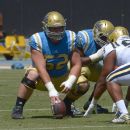How Bill Parcells used four first-round picks in 2000 to rebuild the Jets
The New York Jets didn’t plan to make NFL draft history in 2000. Ironically, it started with a hostile divorce. And then another.
After three seasons of relative prosperity under Bill Parcells, who had stepped down as coach after the 1999 season, the Jets reverted to their past reputation with the shocking departures of coach Bill Belichick and star wide receiver Keyshawn Johnson. They were cast as an organization in chaos, unable to keep their best employees happy.
New millennium, Same Old Jets.
Then the 2000 NFL draft happened.
2 Related
In one wild, franchise-altering afternoon, the Jets made four first-round picks — unprecedented in the common-draft era (since 1967). There have been 16 instances when a team made three selections in the first round, most recently last year with the Parcells, who famously left the Patriots in 1997 because he wasn’t allowed to shop for the groceries before cooking the meal, was given carte blanche with the Jets. After promoting Al Groh to replace him on the sideline, Parcells maintained final say on personnel and ran the organization in an Oz-like fashion. He stayed hidden from the media but was the booming voice behind the curtain, pulling the levers.Bill Parcells, director of football operations
• Most recent mock: Kiper » | McShay »
• Kiper’s Big Board » | McShay’s tiers »
• First Draft podcast » | Draft order »
• Full class rankings from Scouts Inc. »
More NFL draft coverage »
It took guts to trade Johnson, a dynamic wide receiver, but Parcells shipped him off because of “the economics,” he said. Parcells knew he was going to leave the organization in a year, which he did, and he wanted to leave the franchise in a good place.
In a recent interview with ESPN, Parcells downplayed those intentions, insisting his objective was simply to find good players for the coach. As it turned out, four coaches benefited — Groh, Herm Edwards, Eric Mangini and Rex Ryan, all of whom coached at least one of the four players.
“When you’re picking four in the first 27, you figure you better do something,” Parcells said. “You’d be disappointed if that didn’t turn out OK. I’d like to have that every year.”
Parcells credited personnel director Dick Haley for playing an instrumental role. A holdover from the previous regime, Haley made his bones as the personnel chief for the Pittsburgh Steelers during their 1970s dynasty. Despite their different personalities — Parcells was fire, Haley calm and cool — they hit it off.
“He was one of the best personnel guys in the history of the league,” Parcells said. “He was the best guy I could’ve had next to me at the Jets. There just wasn’t a better guy.”
Shaun Ellis, DE, No. 12 pick
Career highlights: He played 12 seasons, his final year with the Patriots in 2011. He played in 184 out of 192 games, recorded 73.5 sacks and made two Pro Bowls.
On the eve of the draft, Parcells phoned former coaching adversary Bill Walsh, the Career highlights: He played 15 seasons for the Jets,
Just like that, the Jets had a new pass-rushing tandem. Abraham was a rare commodity, a gifted edge rusher who produced a double-digit sack total in eight total seasons. His original goal was to retire a Jet, but he was traded to the Falcons in 2006. He believes a 2003 DWI arrest destroyed his relationship with Coach Edwards (“We never got along that well,” he said), which might have been the beginning of the end. Abraham’s career turned out just fine, but it took a physical toll. Forced to retire because of a concussion — he said tests revealed two spots of blood on his brain — Abraham experiences occasional migraines and loss of memory. “Sometimes I get a little lost in life,” said Abraham, who moved out of a house and into a condo because the smaller dwelling made it easier to find objects such as his credit cards and car keys. “There are certain things that I can’t do that I used to do.” He lives a quiet life, splitting his time between Atlanta and Columbia. His goal is to become a better father, run football camps for kids and start the next chapter. He promised himself that he would have a new direction by the time he was five years out of football. It has been five years. Looking back, Abraham wonders what might have been with the Jets. “It was tough for all of us to leave the Jets, especially when we left and how we left because all of us wanted to finish our careers together,” he said, referring to his three first-round classmates. “We knew it was going to be tough to stay together and win a championship. For four first-round picks, that would’ve been awesome to do.” 0:58 Former Jets QB Chad Pennington describes what he was feeling after being drafted 18th overall in the 2000 NFL draft. Career highlights: He led the Jets to the playoffs in 2002, 2004 and 2006. He’s fourth on their career passing list (13,738 yards). He led the Miami Dolphins to the AFC East title in 2008 and was twice named NFL Comeback Player of the Year (2006 and 2008). Twenty years later, Kiper still can’t believe the Jets got Pennington with the 18th pick. He described it as unconventional strategy. “It’s rare to see a team wait to take a quarterback they really believe in as a first-rounder,” Kiper said. “This was 2000, so we weren’t as quarterback crazy as we are now, but to sit and wait was a gamble — and it paid off.” Parcells said that he had no intention of drafting a quarterback because they felt good with Vinny Testaverde, 37 at the time, and a young Ray Lucas (27), but that he felt Pennington’s value was too good to pass up. Everybody expected the Steelers, in the pre-Ben Roethlisberger days, to grab Pennington with the No. 8 pick. “Everybody” included Pennington, who worked out for Steelers officials in his hometown of Knoxville, Tennessee. The 49ers also showed a lot of interest, but they passed on him at No. 16. • Career highlights: He played for five teams over the course of 12 seasons, making him the most traveled of the four. He made 188 total receptions, 12th among all players in the 2000 draft. On a pre-draft visit, Becht was informed by Parcells that the team’s plan was to draft a tight end, either him or Bubba Franks. When he saw Franks go to the Relive the NFL’s greatest games, original series and more. Watch on ESPN+ “I was kind of depressed,” Becht recalled. “I’m thinking, ‘I can’t believe Coach Parcells lied to me. This is crazy.'” Becht found out when everybody else did, when it was announced on TV. In a way, the moment symbolized his career because he always was an under-the-radar player, tasked with performing the dirty work. In 2004, his perimeter blocking helped Jets star Curtis Martin win the NFL rushing crown. Although he never attained star status, Becht is proud of his pro career because he was able to adapt quickly to different systems over a long period of time. Like Pennington, Becht has stayed involved in the sport — as a college football analyst for ESPN. He’s also grooming his son, Rocco, a promising high school quarterback in the Tampa, Florida, area. One day recently, he was out of breath when he answered a reporter’s call. He had been running routes for his son. His days as a blocking tight end are over. Looking back on the 2000 draft, which included a terrific third-round pick in wide receiver Laveranues Coles, Becht said, “From top to bottom, I don’t think you’ll ever see that again — five guys out of one draft class. I know I’m biased, but that’s hard to fathom.” Relatively new to the business in 2000, Tannenbaum managed the Jets’ salary cap and negotiated the contracts, which means it was his job to sign the draft picks. In those days, a first-round contract was heavy lifting because this was before the rookie slotting system. The directive from Parcells was to get them done by the start of training camp. With camp approaching, Tannenbaum flew to Chicago to meet with agent Tom Condon, who represented Pennington, the last unsigned pick. They reached an agreement on the eve of training camp, resulting in a spicy reward from Parcells: A bucket of 100 chicken wings from the local Hooters restaurant. “When he got nervous, he would eat,” said Parcells, laughing at the memory. “I was a little like that myself in my younger years.” Tannenbaum enjoyed the wings, but the biggest satisfaction was knowing he did his part. The scouts scouted, Parcells made the decisions and Tannenbaum got all four first-round picks signed on time for camp. “I didn’t want to let anyone down,” said Tannenbaum, who is also an ESPN analyst. “It was a feeling of comfort, but it lasted only 10 or 15 minutes. Coach Parcells never let you rest.”John Abraham, No. 13
Larry Hardesty and Gordon Damer debate if Coach Joe Judge or Adam Gase will have a tougher job this season and much more. » Listen hereChad Pennington, QB, No. 18
Anthony Becht, TE, No. 27
Mike Tannenbaum, director of pro player development





